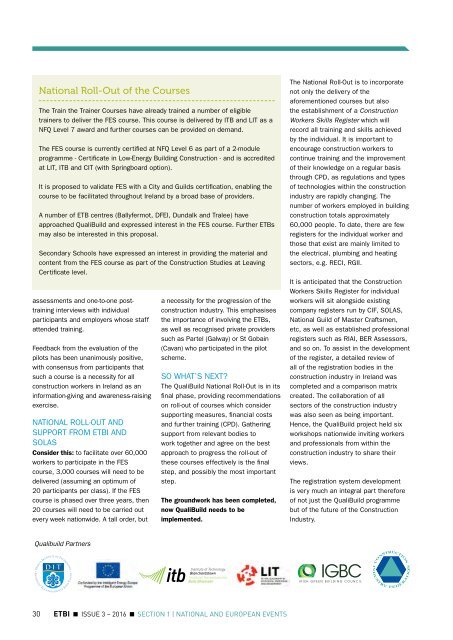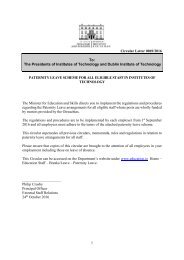ETBI-News-Summer-2016-web
ETBI-News-Summer-2016-web
ETBI-News-Summer-2016-web
Create successful ePaper yourself
Turn your PDF publications into a flip-book with our unique Google optimized e-Paper software.
National Roll-Out of the Courses<br />
The Train the Trainer Courses have already trained a number of eligible<br />
trainers to deliver the FES course. This course is delivered by ITB and LIT as a<br />
NFQ Level 7 award and further courses can be provided on demand.<br />
The FES course is currently certified at NFQ Level 6 as part of a 2-module<br />
programme - Certificate in Low-Energy Building Construction - and is accredited<br />
at LIT, ITB and CIT (with Springboard option).<br />
It is proposed to validate FES with a City and Guilds certification, enabling the<br />
course to be facilitated throughout Ireland by a broad base of providers.<br />
A number of ETB centres (Ballyfermot, DFEI, Dundalk and Tralee) have<br />
approached QualiBuild and expressed interest in the FES course. Further ETBs<br />
may also be interested in this proposal.<br />
Secondary Schools have expressed an interest in providing the material and<br />
content from the FES course as part of the Construction Studies at Leaving<br />
Certificate level.<br />
assessments and one-to-one posttraining<br />
interviews with individual<br />
participants and employers whose staff<br />
attended training.<br />
Feedback from the evaluation of the<br />
pilots has been unanimously positive,<br />
with consensus from participants that<br />
such a course is a necessity for all<br />
construction workers in Ireland as an<br />
information-giving and awareness-raising<br />
exercise.<br />
National Roll-Out and<br />
Support from <strong>ETBI</strong> and<br />
SOLAS<br />
Consider this: to facilitate over 60,000<br />
workers to participate in the FES<br />
course, 3,000 courses will need to be<br />
delivered (assuming an optimum of<br />
20 participants per class). If the FES<br />
course is phased over three years, then<br />
20 courses will need to be carried out<br />
every week nationwide. A tall order, but<br />
a necessity for the progression of the<br />
construction industry. This emphasises<br />
the importance of involving the ETBs,<br />
as well as recognised private providers<br />
such as Partel (Galway) or St Gobain<br />
(Cavan) who participated in the pilot<br />
scheme.<br />
So what’s next?<br />
The QualiBuild National Roll-Out is in its<br />
final phase, providing recommendations<br />
on roll-out of courses which consider<br />
supporting measures, financial costs<br />
and further training (CPD). Gathering<br />
support from relevant bodies to<br />
work together and agree on the best<br />
approach to progress the roll-out of<br />
these courses effectively is the final<br />
step, and possibly the most important<br />
step.<br />
The groundwork has been completed,<br />
now QualiBuild needs to be<br />
implemented.<br />
The National Roll-Out is to incorporate<br />
not only the delivery of the<br />
aforementioned courses but also<br />
the establishment of a Construction<br />
Workers Skills Register which will<br />
record all training and skills achieved<br />
by the individual. It is important to<br />
encourage construction workers to<br />
continue training and the improvement<br />
of their knowledge on a regular basis<br />
through CPD, as regulations and types<br />
of technologies within the construction<br />
industry are rapidly changing. The<br />
number of workers employed in building<br />
construction totals approximately<br />
60,000 people. To date, there are few<br />
registers for the individual worker and<br />
those that exist are mainly limited to<br />
the electrical, plumbing and heating<br />
sectors, e.g. RECI, RGII.<br />
It is anticipated that the Construction<br />
Workers Skills Register for individual<br />
workers will sit alongside existing<br />
company registers run by CIF, SOLAS,<br />
National Guild of Master Craftsmen,<br />
etc, as well as established professional<br />
registers such as RIAI, BER Assessors,<br />
and so on. To assist in the development<br />
of the register, a detailed review of<br />
all of the registration bodies in the<br />
construction industry in Ireland was<br />
completed and a comparison matrix<br />
created. The collaboration of all<br />
sectors of the construction industry<br />
was also seen as being important.<br />
Hence, the QualiBuild project held six<br />
workshops nationwide inviting workers<br />
and professionals from within the<br />
construction industry to share their<br />
views.<br />
The registration system development<br />
is very much an integral part therefore<br />
of not just the QualiBuild programme<br />
but of the future of the Construction<br />
Industry.<br />
Qualibuild Partners<br />
IRISH GREEN BUILDING COUNCIL<br />
30 <strong>ETBI</strong> issue 3 – <strong>2016</strong> Section 1 | National and European Events





